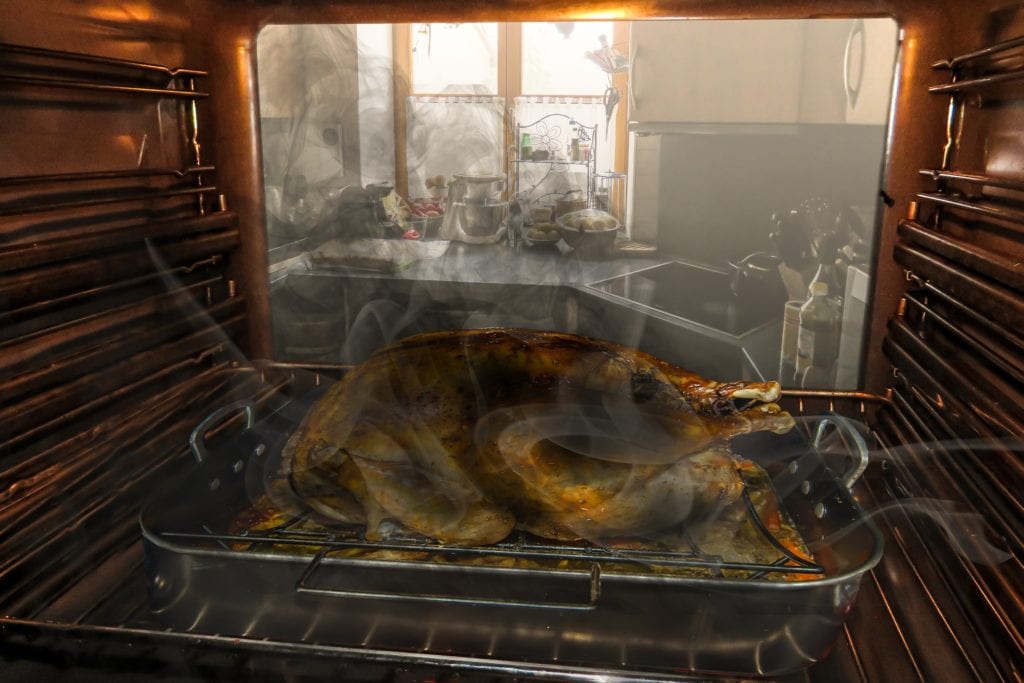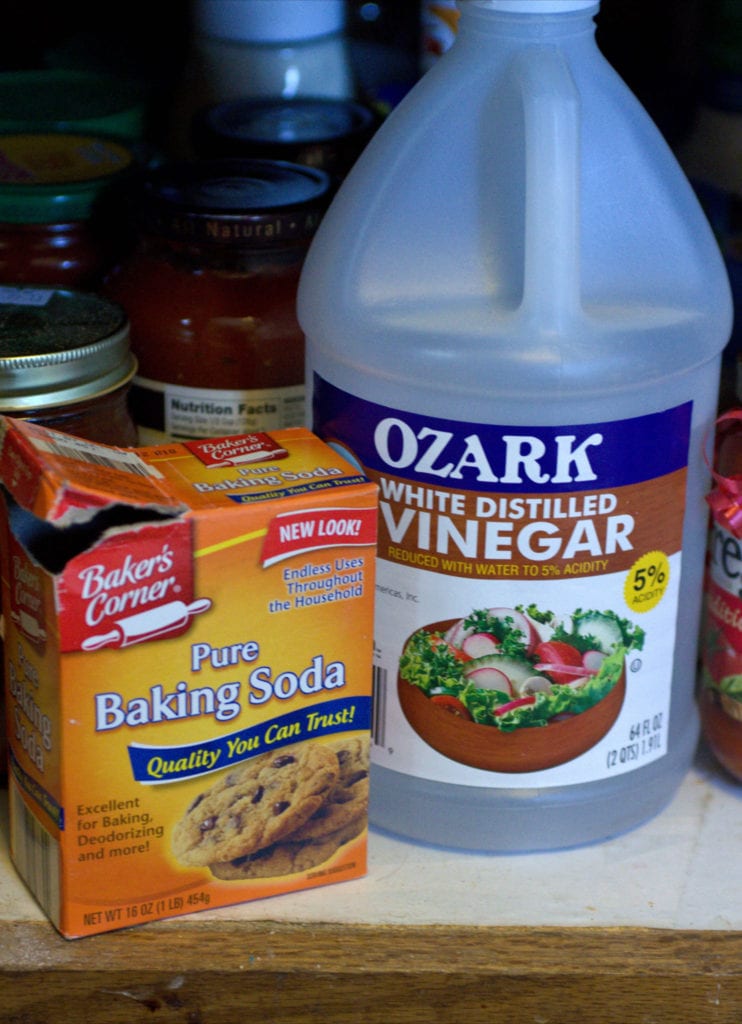Cleaning your oven is an unglamorous but necessary job that has to be done in order to keep your kitchen hygienic and your food safe to eat. Taking the decision to clean your oven yourself, rather than hire a local oven cleaning service company to do the job for you, does require a bit of research in order for you to not waste your time or accidentally damage your appliance. But who better to help you learn how to clean an oven than oven-cleaning experts themselves?
If you are looking for what to clean your oven with, or are stumped on how to clean an oven, you may be surprised at how little you need in terms of oven cleaning products. In most cases, you won’t even need to leave the house in order to achieve the desired effect; common cleaning products and ingredients from your kitchen cupboards can come to your rescue.
We’ve put together some relatively easy oven-cleaning tips using simple products from your cupboards only. Approach any oven cleaning or DIY task with caution: Ovenu is not responsible for potential health risks that might come from mixing household products.
Contents
Why should you clean your oven?
Cleaning your oven regularly ensures that your appliance stays in good working order for as long as possible. Just like any other mechanical appliance, continual use can lead to wear and tear, which is only exacerbated by allowing grime, grease and food residue to build up.
When this happens your oven isn’t able to operate efficiently, so more energy is used to do the same tasks, filters can get clogged and your oven could start producing noxious fumes that affect your food’s taste and soaks into any soft furnishings you have in the room.
How often should you clean your oven?
You should aim to have your oven cleaned thoroughly every two to twelve weeks, however, this time frame depends on how much you use your oven and what you’re cooking in it. If you’re cooking foods that are likely to spill or splatter in the oven, or you tend to be a messy cook in general, then you may find that you’re in need of an oven clean more often.
Taking preventative action can help to reduce the frequency that your oven needs cleaning. For example, you could ensure that you place a spare baking tray at the bottom of your oven whenever you’re cooking food that is likely to drip. If you’re looking to make the most out of your deep oven cleans then you could give your oven a quick wipe-down after each use, just make sure it’s properly cooled down beforehand!
Related: How Often Should You Clean Your Oven?
How to clean an electric oven?
While both gas and electric ovens provide you with the same service, they each require different cleaning techniques and often specific products to ensure they are kept in good condition.
To help guide you through the best specific cleaning methods and tips for your oven, we’ve crafted a detailed blog outlining how to clean an electric oven and how to clean a gas oven.
When is the best time to clean your oven?
The best time to clean your oven will depend on how you are planning on using it and how much the oven is in need of cleaning. Many people choose to book a professional oven clean in the lead-up to Christmas, whereas others prefer to wait until after the carnage of the big day to get a cleaner in.
If your oven is yet to be heavily soiled, then often the best time to clean your oven is before it gets into such a bad state. In some cases, you may wish to get it spick and span before having guests around.

What are the signs that my oven needs cleaning?
There are a few tell-tale signs that your oven needs cleaning. We can often overlook or take for granted the dirty state of our ovens. Sometimes it takes a serious wake-up call to notice that something is amiss at all. Dirty ovens can often fail to reach their optimum heat or may break down altogether if they get too dirty.
More subtle signs that your oven needs cleaning might be smoke appearing when you’re pre-heating or a change of taste in your food. If you can’t actually remember when you last cleaned your appliance, then this might also be a sign that it could do with a scrub!
How to Clean an Induction Hob?
Cleaning an Induction Hob may seem simple, but using the wrong methods and products can cause irreversible damage to your induction hob and may require you to purchase new hobs. Because of this, we’ve created a detailed guide on how to clean an induction hob that includes everything you need to know about cleaning induction hobs.
Is My Oven Broken?
Unaware of many oven issues such as smoking oven problems, many homeowners are unable to distinguish between complications caused by a build-up of grit, grime and terminal mechanical oven issues.
This results in many oven owners wasting hundreds of pounds on a new oven when they could have fixed their own with a thorough cleaning – saving them hundreds of pounds. See our ‘Is It Broken‘ blog for troubleshooting help relating to potentially faulty ovens.
What are the Dangers of a Dirty Oven?
In addition to providing owners with dirty food and ample inconvenience, Dirty Ovens are dangerous to our health. See our ‘Dangers of a Dirty Oven‘ blog for a detailed look at how Dirty Ovens provide various hazards.
How to Clean Oven Glass
Your oven door is the most visible part of your oven and therefore the most rewarding part to start cleaning. With common household products from your cupboards, you can create a gentle scrub that will leave your glass oven door looking shiny.
You can clean the inside and outside of your glass oven door yourself. However, properly cleaning an oven requires a few tools and the help of another person. Oven door glass is tempered to withstand heat, but can quickly become stained by grease and fat after just a few uses.
Unless you stay on top of these stains, they can quickly build up until you can no longer see the food cooking in your oven! There are a few methods of cleaning oven door glass, ranging from using your self-cleaning settings to getting the tools out and taking your door apart (our preferred method).
Related: How To Clean A Glass Oven Door
How To Clean Oven Racks
Dirty oven racks can lead to pungent smells once you turn the oven on. In order to avoid the smell of burnt-on grease ruining the aroma of a Sunday Roast, you’ll need to remove the grime as best as you can.
Cleaning your oven racks yourself is perfectly possible if you’re willing to invest in the right products and spend the time needed to do the job properly. A professional oven cleaner should always include cleaning your oven racks as part of the service, but if you’ve taken on the entire oven cleaning job yourself then you may be wondering how to get them sparkling clean.
There are a few DIY methods to cleaning your oven racks, including using bin bags, soaking them in the bath and using dishwasher tablets.
Related: How To Clean Oven Racks [Guide]
How to Clean an Oven with Lemon
If life gives you lemons, clean your oven! The citrus oil in lemons is great at detaching grease, so if you have these yellow fruits lying about in your fridge, you can use them to loosen the grime and clean the inside of your oven.
First, preheat your oven to 250°C. Cut two lemons in half and squeeze their juice into a baking dish; when they have been squeezed dry, you can add the remaining casings too. Now, add water to the dish until it’s one-third full. Wait until the oven has reached its temperature, and place the dish inside the oven. Set a timer for 30 minutes, then simply sit back and relax!
After half an hour of baking, remove the oven dish again, switch the oven off and wait until it’s cooled. While the lemon juice was vaporising, it will have attached itself to the grime, unsticking it from the oven walls, floor and ceiling. Wiping the grease away will now be much easier! You can use a spatula to remove any big chunks of debris that are left inside – use the remaining lemon water to scrub the rest of the grime away with a scouring sponge.
Warning: during the cleaning process, your oven will produce a lot of smoke. Turn on the oven fan and open a window to keep the smoke alarm from going off.

How to Clean an Oven with Baking Soda
The best way to clean your oven yourself is to use baking soda and vinegar. The process for cleaning your oven with this method is pretty elaborate, so we have explained it step by step in a dedicated article about how to clean an oven door with Baking Soda and Vinegar.
Cleaning an oven with baking soda and water is a well-known technique that can make removing stubborn stains or removing grime a simple task. The chemical reaction that is produced by combining these two household products helps to aggravate stuck-on food.
By creating a simple cleaning paste and then using some vinegar to finish the job, you can return a mildly soiled oven back to a decent-looking condition. Of course, when using household products such as these, you can’t expect to get quite the same results as you would with a professional oven clean.
How to Clean an Oven With Vinegar
Vinegar is a powerful storecupboard essential that can double as a handy, eco-friendly oven cleaning product in a pinch. Combining vinegar with water in an oven-safe bowl creates an acidic solution which can then be placed in a hot oven. The heat from the oven boils the vinegar solution in the oven until it forms powerful steam that works away at the grime that has collected on the interior of your oven.
You may end up needing to supplement this cleaning method with some spot treatment, as it’s not always 100% effective. In some cases, a repeat treatment can help to further loosen burnt-on stains, but you may still have to reach for the baking soda and a sponge to remove the more stubborn spots.
Related: How to Clean your Oven with Vinegar
How to Clean an Oven Without Baking Soda
If you’re short on baking soda then you might have to try using some more conventional cleaning products to get the job done. One product that is often overlooked as a cheap oven cleaner is washing-up liquid. Formulations of different washing-up liquids can vary wildly, so it may take some trial and error to find one powerful enough to do the trick.
Using washing-up liquid to clean your oven requires much the same technique as using the previous methods. Make sure you have a decent scratch-free scourer or sponge so that you can get safe abrasive contact with the oven before you start.
It’s worth having a spare bottle of washing-up liquid on hand too, as you may find that you’ll need more than your usual dishwashing load’s worth to have the desired effect!

How to Clean Oven Trays
Cleaning your oven trays is another necessary job that can quickly get out of hand if left unattended for a long time. Oven trays that have accumulated grease, fat and burnt-on food might seem like lost causes that are destined for the bin, but there are ways to return them to their former glory.
The first step is always to remove as much loose grease or fat using a paper towel, before using boiling water and some kind of detergent to degrease and remove burnt food. You may find that repeat soaks are required to get the job done.
Related: How to Clean Oven Trays [Guide]
These DIY oven cleaning methods are great for maintaining your oven – however, every now and then you might want to invest in a professional deep clean.
Ovenu’s experienced oven technicians can get your oven back to near-showroom condition, saving you a lot of scrubbing!
Give us a call on 0800 140 9800 to get a quote or get in touch, and we can be at your doorstep on a day and time that suits you.
